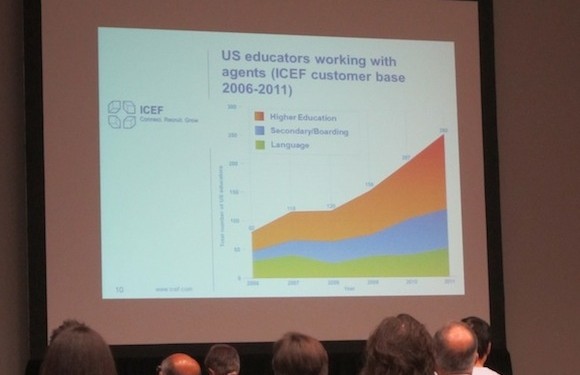A familiar debate was held during NAFSA’s recent conference this month: on the use of agencies in the international student recruitment process. There was a slight shift in tone, however, with David Hawkins, Director of Public Policy and Research at NACAC, noting at one point, “This is an issue that can be and will be resolved.”
News and business analysis for Professionals in International Education
Have some pie!
Rapprochement during NAFSA agency debate
 Panellist Markus Badde of ICEF revealed upward-trending stats relating to their clients in the USA
Panellist Markus Badde of ICEF revealed upward-trending stats relating to their clients in the USA Hawkins shared a panel with Markus Badde of global networking company, ICEF and Mitch Leventhal, Vice President of agency standards authority, AIRC (as well as VC at State University of New York); both of whom work extensively with education agencies globally. Hawkins made it clear that all parties around the debate of “what is ethical” were committed to working closely together.
Moreover, he underlined that NACAC’s position is not anti-agency; rather it is exploring the ethics of compensation; the per-head commission model which it does outlaw domestically.
NACAC’s Commission on International Student Recruitment reports back in October this year, just before its annual conference.
NACAC’s position is not anti-agency; rather it is exploring the ethics of compensation
Hawkins stressed that the 5,500-membership body wants to help institutions recruit internationally and undertake research into student outcomes. “We want to be of practical use for our members as well as having an esoteric discussion,” he said, pointing out that NACAC is not a standards setting agency but “we were asked to be involved by our members”.
Leventhal made the point that there is a mixed message from the US government on using agencies in international education recruitment. The Department of Commerce offers a “goldkey” service which can facilitate agency introductions in overseas markets, while the State Department and Education USA does not recognise agency relationships.
He went further in saying that Education USA is ignoring federally-recognised agency standards, as implemented by AIRC, that are in existence.
Badde at ICEF outlined that despite the ongoing debate over the ethics of agents, the number of ICEF customers representing HE institutions in the USA – attending workshops to meet screened, professional student recruiters – had soared in the past few years, as educators were keen to compete globally.
“Agencies are something that is real and NACAC has no problem with that”
There was uniform agreement that standards and transparency were important when dealing with agencies. Hawkins added, “Agencies are something that is real and NACAC has no problem with that.”
One delegate listening to the panel discussion was Paul McVeigh, Associate Vice President of Global Studies and Programs at Northern Virginia Community College. He told The PIE News that his institution was considering a position change on working with agencies.
“We don’t presently use agents because we read our accreditation guidelines in a certain way (no per head commissions); but the present national debate is evidence enough that a different attitude is emerging,” he said. “[We might] well proceed with our own revised interpretation, which will certainly involve close scrutiny of agencies.”
Still looking? Find by category:



This is interesting subsequent reading – another perspective!: http://www.insidehighered.com/blogs/world-view/educationusa-advisors-should-not-be-cavorting-agents
The writings of Philip Altbach and Liz Reisberg always have that fantastical “sky is falling” quality, which is so particular to children’s stories.
It is good that serious debate is taking place on the issue of commission-based recruitment abroad. We have used such agents for years, and have found the commission question entirely a non issue. The main issue is what standards schools have for the agencies they use and how they enforce those standards. College admissions officers and recruiters get paid for bringing students to their campuses, not for providing an unbiased survey of all the educational choices students have. They will not have a job for long if they bring unqualified or unsuitable students to campus, where they have bad experiences. Similarly, agencies will not last very long if they send students to the wrong schools or programs, commission or not. Let this good debate continue.